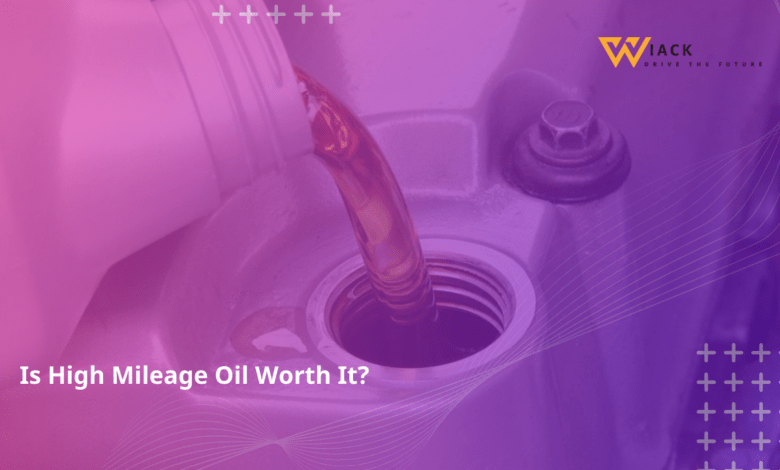Is High Mileage Oil Worth It?

Did you know that over 66 million search results pop up when you look for “high mileage oil” online? This staggering number highlights just how many drivers are curious about whether high mileage oil is worth the investment. As vehicles age and rack up miles, owners often wonder if switching to a specialized oil could breathe new life into their trusty rides. Let’s dive deep into the world of high mileage oils and uncover whether they’re truly worth the hype.
Understanding High Mileage Oil
What is High Mileage Oil?
High mileage oil is a specially formulated motor oil designed for vehicles with 75,000 miles or more on the odometer. These oils contain unique additives and conditioners that cater to the specific needs of older engines. But what exactly sets them apart from regular motor oils?
High mileage oils typically include:
- Seal conditioners to help prevent leaks
- Detergents to clean out sludge and deposits
- Anti-wear agents to reduce engine wear
- Antioxidants to prevent oil breakdown
These special ingredients work together to address common issues faced by aging engines, such as oil leaks, increased oil consumption, and reduced performance.
What is Considered High Mileage?
The definition of “high mileage” has evolved over the years. In the past, hitting 100,000 miles was a significant milestone for a vehicle. However, with advancements in automotive technology, cars are lasting longer than ever before.
Today, most high mileage oils are formulated for vehicles with 75,000 miles or more. However, some drivers wait until their cars reach 100,000 or even 150,000 miles before making the switch. It’s important to note that mileage isn’t the only factor to consider. The age of your vehicle and how it’s been driven and maintained also play crucial roles in determining when to switch to high mileage oil.
Benefits of Using High Mileage Oil
The benefits of using high mileage oil are numerous and can significantly impact your vehicle’s performance and longevity. Here are some key advantages:
- Reduced oil leaks: High mileage oils contain seal conditioners that can help rejuvenate old, hardened seals and gaskets, potentially reducing or preventing oil leaks.
- Decreased oil consumption: These oils are often formulated with a higher viscosity, which can help reduce oil burn-off in older engines.
- Improved engine cleanliness: Enhanced detergents in high mileage oils help clean out sludge and deposits that may have accumulated over time.
- Better protection against wear: Additional anti-wear agents provide extra protection for engine components that may have experienced wear over the years.
- Potential for improved fuel efficiency: By keeping the engine cleaner and reducing friction, high mileage oils may contribute to better fuel economy.
Differences Between High Mileage Oil and Regular Oil
When comparing high mileage vs regular oil, several key differences emerge:
- Additive package: High mileage oils contain more robust additive packages specifically designed to address issues common in older engines.
- Viscosity: Many high mileage oils have a slightly higher viscosity to help compensate for engine wear and reduce oil consumption.
- Seal conditioners: Regular oils typically don’t contain the seal-swelling agents found in high mileage formulations.
- Detergents: While regular oils do contain detergents, high mileage oils often have stronger cleaning agents to combat years of deposit buildup.
- Price: High mileage oils are usually more expensive than their regular counterparts due to the specialized additives they contain.
Differences Between High Mileage Oil and Synthetic Oil
It’s also worth noting the differences between high mileage and synthetic oils:
- Base oil: Synthetic oils are made from artificially created molecules, while high mileage oils can be either conventional or synthetic-based.
- Performance in extreme temperatures: Synthetic oils generally perform better in very hot or cold conditions.
- Longevity: Synthetic oils typically last longer between changes, though high mileage oils are formulated to provide extended protection for older engines.
- Additives: While both may contain additives, high mileage oils focus on additives that benefit older engines specifically.
- Cost: Full synthetic oils are usually the most expensive option, with high mileage oils falling somewhere between synthetic and conventional in terms of price.
Who Should Use High Mileage Oil?
Vehicles with High Mileage
The most obvious candidates for high mileage oil are, of course, vehicles with high mileage. But what exactly constitutes “high mileage” in today’s automotive landscape?
As mentioned earlier, most oil for high mileage cars is designed for vehicles with 75,000 miles or more. However, it’s not just about the number on the odometer. Consider switching to high mileage oil if you notice:
- Increased oil consumption between changes
- Oil leaks or stains on your driveway
- Decreased engine performance
- Louder engine noise, especially during cold starts
Remember, every vehicle ages differently. A well-maintained car with 150,000 miles might be in better shape than a neglected vehicle with half that mileage.
Older Vehicles
Age is another crucial factor when considering engine oil for older vehicles. Even if your car hasn’t racked up high mileage, time can take its toll on engine components. Vehicles that are 7-8 years old or older can benefit from high mileage oil, regardless of their actual mileage.
As cars age:
- Seals and gaskets can dry out and shrink
- Engine tolerances may increase due to wear
- Sludge and deposits can accumulate
High mileage oil’s special formulation can help address these age-related issues, potentially extending the life of your older vehicle.
Vehicles Under Stress
It’s not just age and mileage that determine whether a vehicle could benefit from high mileage oil. The conditions under which a car operates also play a significant role. Vehicles that experience frequent:
- Stop-and-go traffic
- Short trips (less than 10 miles)
- Extreme temperatures (very hot or very cold)
- Heavy loads (towing or hauling)
- Dusty or dirty environments
These conditions put extra stress on the engine, potentially accelerating wear and tear. Even if your vehicle hasn’t hit the 75,000-mile mark, if it regularly faces these challenging conditions, it might benefit from the extra protection offered by high mileage oil.
The Impact of High Mileage Oil on Your Engine
Reduced Wear and Tear
One of the primary benefits of high mileage oil is its ability to reduce wear and tear on your engine. As engines age, the clearances between moving parts tend to increase. This can lead to increased friction and accelerated wear.
High mileage oils often have a slightly higher viscosity and contain additional anti-wear additives. These properties help to:
- Fill larger gaps between engine components
- Create a thicker protective film on engine parts
- Reduce metal-to-metal contact
By providing this extra layer of protection, high mileage oils can help slow down the aging process of your engine, potentially extending its lifespan.
Slow Down Leaks
Oil leaks are a common issue in older vehicles. As seals and gaskets age, they can become brittle and shrink, allowing oil to seep through. This is where the seal conditioners in high mileage oil come into play.
These conditioners work by:
- Softening and rejuvenating hardened seals
- Causing slight swelling in seals to improve their sealing ability
- Creating a protective film on seals to prevent future deterioration
While high mileage oil isn’t a guaranteed fix for all oil leaks, many drivers report a noticeable reduction in leaks after switching. This can help keep your engine properly lubricated and prevent messy oil spots on your driveway.
Improve Fuel Efficiency
While the primary goal of high mileage oil isn’t to improve fuel efficiency, it can have a positive impact on your car’s gas mileage. This improvement comes from several factors:
- Reduced friction: The anti-wear additives in high mileage oil can help reduce friction within the engine, allowing it to run more efficiently.
- Cleaner engine: The detergents in high mileage oil help remove sludge and deposits, which can impede engine performance and reduce efficiency.
- Better sealing: By rejuvenating seals and gaskets, high mileage oil can help maintain proper compression, which is crucial for optimal fuel efficiency.
While the improvement in fuel efficiency may be modest, every little bit helps, especially for older vehicles that may not be as efficient as their newer counterparts.
Minimize Sludge Buildup
Sludge buildup is a common issue in older engines, particularly those that haven’t been maintained regularly. This thick, sticky substance can clog oil passages and prevent proper lubrication, leading to accelerated engine wear.
High mileage oils are formulated with powerful detergents that can:
- Break down existing sludge deposits
- Prevent new sludge from forming
- Keep the engine cleaner for longer periods
By minimizing sludge buildup, high mileage oil helps ensure that all parts of your engine receive proper lubrication, which is crucial for longevity and performance.
Cost vs. Benefits
Is High Mileage Oil Worth the Money?
The question of whether high mileage oil is worth it is one that many vehicle owners grapple with. To make an informed decision, it’s important to consider both the costs and potential benefits.
Costs:
- High mileage oil is typically more expensive than regular oil
- You may need to change oil more frequently (though this varies by brand and driving conditions)
Potential Benefits:
- Reduced oil leaks
- Decreased oil consumption
- Improved engine cleanliness
- Better protection against wear
- Potential for improved fuel efficiency
- Possible extension of engine life
For many drivers with older or high-mileage vehicles, the benefits outweigh the additional cost. However, the value proposition can vary depending on your specific situation. Consider factors such as:
- The current condition of your engine
- How long you plan to keep the vehicle
- Your typical driving conditions
- Your budget for vehicle maintenance
Ultimately, if you’re planning to keep your high-mileage vehicle for several more years, the investment in high mileage oil could pay off in terms of reduced wear and potentially avoided repairs.
Alternatives to High Mileage Oil
While high mileage oil can offer significant benefits for older vehicles, it’s not the only option available. Some alternatives to consider include:
- Full synthetic oil: Many synthetic oils offer excellent protection for high-mileage engines without the specific “high mileage” label.
- Synthetic blend oil: These oils offer a middle ground between conventional and full synthetic oils, often at a lower price point than high mileage formulations.
- Oil additives: Some drivers opt to use oil additives in conjunction with regular oil to achieve similar benefits to high mileage oil.
- Engine flush: Performing an engine flush before switching to a high-quality conventional or synthetic oil can help clean out deposits and sludge.
Each of these alternatives has its own pros and cons, and what works best can depend on your specific vehicle and driving conditions. It’s always a good idea to consult with a trusted mechanic or refer to your vehicle’s owner’s manual before making significant changes to your oil regimen.
Other Considerations
How Often Should You Change High Mileage Oil?
The frequency of oil changes when using high mileage oil can vary depending on several factors. While traditional wisdom often suggested changing oil every 3,000 miles, modern oils and engines have extended this interval significantly.
For high mileage oil, consider the following:
- Check your vehicle’s owner’s manual for recommended oil change intervals
- Many high mileage oils can last 5,000 to 7,500 miles between changes
- Some synthetic high mileage oils may last up to 10,000 miles
- Severe driving conditions may necessitate more frequent changes
It’s important to note that while high mileage oils are designed to provide extended protection, older engines may consume or leak oil more quickly. Regular checks of your oil level are crucial, regardless of the type of oil you use.
Can You Mix High Mileage Oil and Regular Oil?
While it’s generally safe to mix high mileage oil with regular oil in an emergency, it’s not recommended as a long-term practice. Mixing oils can dilute the specific benefits of high mileage oil, potentially reducing its effectiveness.
If you find yourself needing to top up your oil between changes:
- Try to use the same brand and type of high mileage oil already in your engine
- If high mileage oil isn’t available, using regular oil temporarily won’t harm your engine
- Plan to have a complete oil change with high mileage oil as soon as possible
Remember, consistency in your oil choice can help maximize the benefits for your high-mileage engine.
In conclusion, the decision to use high mileage oil depends on various factors specific to your vehicle and driving habits. While it can offer significant benefits for many older cars, it’s not a one-size-fits-all solution. By understanding the pros and cons and considering your specific situation, you can make an informed decision about whether high mileage oil is worth it for your vehicle.
Get the latest car news, reviews, and prices at Wiack.com. Your one-stop destination for all things automotive.




